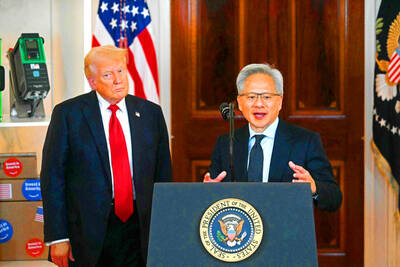Quanta Computer Inc (廣達電腦), the world's largest notebook computer contract maker, yesterday denied a report saying it would launch a joint venture with Hon Hai Precision Industry Co (鴻海精密).
Quanta's shares closed unchanged at NT$56 on the Taiwan Stock Exchange, while Hon Hai was down 4 percent to NT$283.
The Chinese-language Apple Daily reported yesterday that Quanta would collaborate with Hon Hai, the world's largest maker of electronics parts, in a venture focusing on component production.
The new firm is to be set up by early next year, the paper claimed, adding that it will be called Q Bus Inc and that Quanta will hold a 50 percent share. The remaining stake is to be divided between Hon Hai and its affiliates, it said.
Although both companies have repeatedly denied that a merger is in the making, industry sources told the Taipei Times last week that Hon Hai and Quanta had signed a memorandum of understanding on an unknown topic.
The pending resignation of Quanta president Michael Wang (王震華) sparked further speculation that a merger was under way.
In related news, Hon Hai yesterday denied it had any intention of buying a stake in South Korea's LG Philips LCD Co after a report in the Chinese-language Economic Daily News said it may buy a 10 percent to 15 percent stake.
Additional reporting by Lisa Wang

Taiwan Semiconductor Manufacturing Co (TSMC, 台積電) last week recorded an increase in the number of shareholders to the highest in almost eight months, despite its share price falling 3.38 percent from the previous week, Taiwan Stock Exchange data released on Saturday showed. As of Friday, TSMC had 1.88 million shareholders, the most since the week of April 25 and an increase of 31,870 from the previous week, the data showed. The number of shareholders jumped despite a drop of NT$50 (US$1.59), or 3.38 percent, in TSMC’s share price from a week earlier to NT$1,430, as investors took profits from their earlier gains

AI TALENT: No financial details were released about the deal, in which top Groq executives, including its CEO, would join Nvidia to help advance the technology Nvidia Corp has agreed to a licensing deal with artificial intelligence (AI) start-up Groq, furthering its investments in companies connected to the AI boom and gaining the right to add a new type of technology to its products. The world’s largest publicly traded company has paid for the right to use Groq’s technology and is to integrate its chip design into future products. Some of the start-up’s executives are leaving to join Nvidia to help with that effort, the companies said. Groq would continue as an independent company with a new chief executive, it said on Wednesday in a post on its Web

CHINA RIVAL: The chips are positioned to compete with Nvidia’s Hopper and Blackwell products and would enable clusters connecting more than 100,000 chips Moore Threads Technology Co (摩爾線程) introduced a new generation of chips aimed at reducing artificial intelligence (AI) developers’ dependence on Nvidia Corp’s hardware, just weeks after pulling off one of the most successful Chinese initial public offerings (IPOs) in years. “These products will significantly enhance world-class computing speed and capabilities that all developers aspire to,” Moore Threads CEO Zhang Jianzhong (張建中), a former Nvidia executive, said on Saturday at a company event in Beijing. “We hope they can meet the needs of more developers in China so that you no longer need to wait for advanced foreign products.” Chinese chipmakers are in

POLICY REVERSAL: The decision to allow sales of Nvidia’s H200 chips to China came after years of tightening controls and has drawn objections among some Republicans US House Republicans are calling for arms-sale-style congressional oversight of artificial intelligence (AI) chip exports as US President Donald Trump’s administration moves to approve licenses for Nvidia Corp to ship its H200 processor to China. US Representative Brian Mast, the Republican chairman of the US House Committee on Foreign Affairs, which oversees export controls, on Friday introduced a bill dubbed the AI Overwatch Act that would require the US Congress to be notified of AI chips sales to adversaries. Any processors equal to or higher in capabilities than Nvidia’s H20 would be subject to oversight, the draft bill says. Lawmakers would have